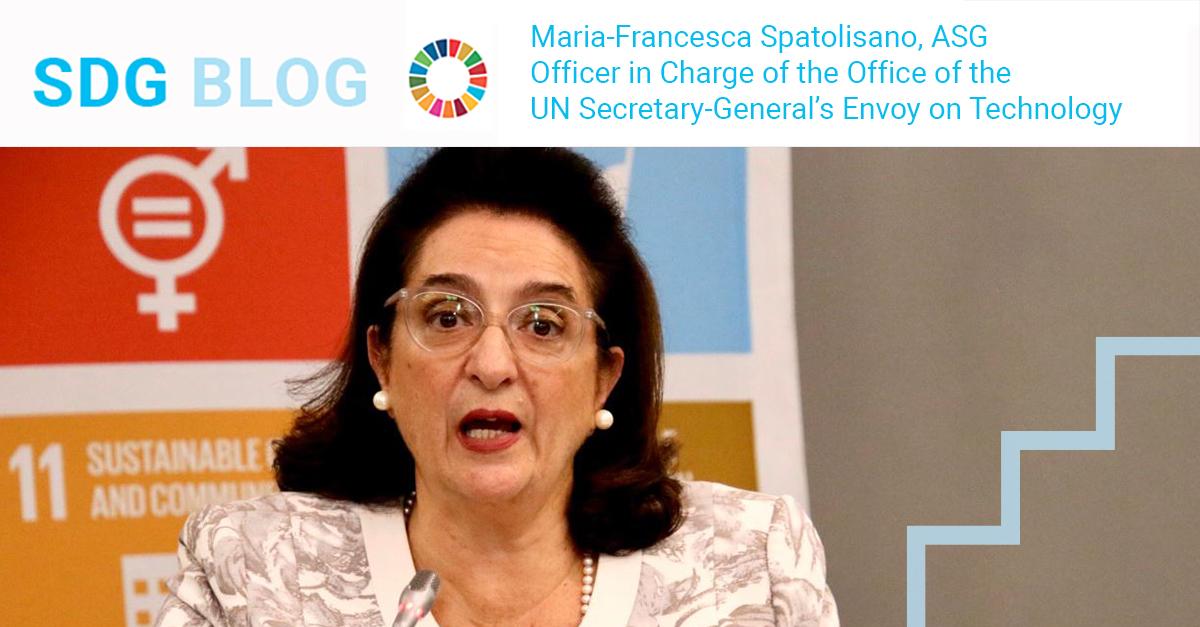SDG Blog

Building an open, free and secure digital future for all
By Maria-Francesca Spatolisano, UN Assistant Secretary-General and Officer in Charge of the Office of the UN Secretary-General’s Envoy on Technology
If you are reading this online, you are fortunate to be in the third of humanity that has access to Internet. 2.9 billion people, particularly in Least Developed Countries, are not as lucky and they are being left behind even further in our brave new digital world.
Last year, the UN Secretary-General António Guterres predicted the digital transformation to be, along with the climate crisis, one of the “two seismic shifts that will shape the 21st century."
The COVID-19 pandemic has only accelerated this tectonic change. I did not expect to witness, in this decade, the sci-fi-like images of world leaders meeting in virtual reality for an online UN General Assembly. And yet, today, we scarcely notice anything unusual about online or hybrid meetings, even becoming experts on strategically muting and unmuting ourselves.
Digital technologies have the power to narrow inequalities and drive progress towards each of the Sustainable Development Goals. They can help the microentrepreneur to connect to new markets, allow children on the move to access education and give vulnerable communities a voice. The rapid growth of telemedicine, which enables doctors to reach remote areas, is just one opportunity with potential for saving millions of lives.
Because many of these applications rely on Internet connectivity, bridging the digital divide is front and centre of the Secretary-General’s two cornerstone global plans: the Roadmap for Digital Cooperation, and Our Common Agenda. A key building block of these efforts is the Giga initiative to bring every school in the world online.
At the same time, despite the tremendous potential of digital technologies for good, they also pose significant risks. Since the very beginning of this global pandemic, we saw mobile apps rolled out to assist in contact tracing in an attempt to contain the spread of COVID-19. However, without proper safeguards and oversight, the ability to track a person’s every step opens the risk for personal data to be accessed by unauthorized parties or used for other purposes than protecting public health.
Likewise, artificial intelligence opens up a world of new opportunities, but biases encoded in their algorithms or unethical use can turn these promises into a dystopia of exacerbated inequalities and human rights violations.
Not unlike the climate crisis, the digital transformation is a global issue and it calls for global solutions. Take social media platforms for example. Several billion people—over half the world’s population—are now on social media, using them for everything from networking with classmates and advocating for causes or candidates to selling goods and, of course, sharing cat photos.
For people in some regions, social media sites “are the Internet.” But beyond the cute cats and memes, the social media platforms are also used to fuel genocide, spread disinformation, and exploit children, often by perpetrators based in different countries than the platform. Providing effective and timely oversight of social media platforms and other digital technologies is a defining challenge, both for tech companies as well as for governments.
As the world’s largest and most representative international organization, the United Nations plays a vital role in supporting cooperation on technology, to optimize its potential benefits for sustainable development while mitigating its potential harms. Indeed, in global consultations on the occasion of the 75th anniversary of the United Nations, people ranked digital transformation as a priority and looked to the United Nations. The General Assembly pledged to “improve digital cooperation” and agreed that “the United Nations can provide a platform for all stakeholders to participate in such deliberations.”
The Secretary-General has already taken steps in this direction. This year, he established the position of Envoy on Technology to guide the strategic approach to technology issues and serve as an advocate and focal point for digital cooperation. The Office of the Envoy on Technology, which I currently lead in my personal capacity, has coordinated the implementation of recommendations from the Roadmap for Digital Cooperation. And in his report “Our Common Agenda”, the Secretary-General calls for a Global Digital Compact, to outline the shared principles for an open, free and secure digital future for all.
The Internet Governance Forum, which convenes this month in Katowice, Poland, is the preeminent multistakeholder venue for discussing key Internet policy issues. The Forum brings together thousands of participants from around the world, representing a range of stakeholder groups, with robust engagement of civil society.
This year’s Forum will include over 200 sessions, focusing especially on economic and social inclusion and human rights, and universal access and meaningful connectivity, in addition to four cross-cutting themes.
In November, the UN also issued a call for nominations for a new Leadership Panel, to be composed of high-level representatives from multiple stakeholder groups. The Panel will advise the Secretary‑General, provide strategic input, support engagement, and exchange outputs from the Forum with other stakeholders and relevant fora.
The Panel will also be fundraising to ensure the long-term sustainability of the Forum. With the international community’s bold ambitions for the governance of the digital space, the Internet Governance Forum will need more resources to ensure that discussions on Internet governance lead to meaningful positive change for all.
As we gear up to address the digital transformation and look ahead to 2030 and beyond, I encourage everyone to be engaged. Join us for the Internet Governance Forum and share your ideas as we prepare for the Summit of the Future, where we hope to adopt history’s first Global Digital Compact. I am excited for the future we can build together.
 Welcome to the United Nations
Welcome to the United Nations